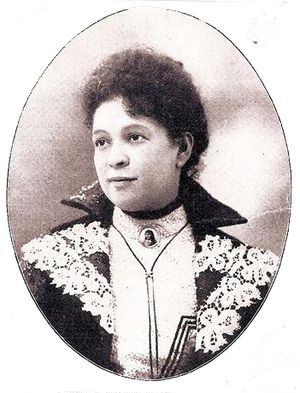Lottie Wilson Jackson facts for kids
Quick facts for kids
Charlotte "Lottie" Wilson Jackson
|
|
|---|---|
 |
|
| Born |
Charlotte Wilson
1854 Niles, Michigan, US
|
| Died | January 16, 1914 (aged 59–60) Niles, Michigan, US
|
| Nationality | American |
| Other names | Lottie Wilson |
| Alma mater | School of the Art Institute of Chicago |
Charlotte "Lottie" Wilson Jackson (1854 – January 16, 1914) was an American artist and activist from Michigan. She was also known as "Lottie Wilson." She made history as the first African American to attend the School of the Art Institute of Chicago. In 1901, Lottie helped organize an exhibition of African-American artists at the Pan-American Exposition. She signed her paintings and sculptures as "Lottie Wilson."
Contents
About Lottie Wilson Jackson
Early Life and Art Studio
Lottie Wilson was born in 1854 in Niles, Michigan. As an adult, she lived in Bay City, Michigan. She had an art studio there that was open for people to visit. In 1901, Lottie moved to Washington, D.C. There, she opened another art studio. She held art shows and taught classes until 1905. She was married three times and had three children.
Her Amazing Artworks
Lottie Wilson was a talented oil painter and sculptor. She also provided gallery space for other artists. Her large oil painting, "President Lincoln with a Former Slave," was created in 1902. This painting shows Abraham Lincoln with the famous women's rights activist, Sojourner Truth.
President Theodore Roosevelt accepted this painting for the White House's permanent art collection. This made Lottie Wilson the first African-American artist whose work became part of the White House collection. She also painted a portrait of Booker T. Washington for the Tuskegee Institute. In 1892, she painted a portrait of Charles Sumner for the Provident Hospital in Chicago.
Fighting for Women's Rights
Lottie Wilson was a strong supporter of women's rights. She spoke about how women were making progress at churches and art studios in the late 1800s. She gave speeches at important meetings, including the first annual convention of the League of Colored Women in Washington D.C. in 1896. She also spoke at the Michigan Equal Suffrage Association convention in 1898.
In 1899, Lottie represented Bay City, Michigan at the National Women’s Suffrage Association Convention in Dunkirk, New York. In 1897, she helped start the Phillis Wheatley Home in Detroit. This home was part of a national club for African-American women. It offered lodging, educational programs, and a place to discuss political issues. Lottie was a member of several important groups, such as the Afro-American Council (AAC), the National Association of Colored Women (NACW), and the National American Woman Suffrage Association (NAWSA).
Working for Equal Rights
Lottie Wilson also worked to end segregation. Segregation meant keeping people of different races separate, like on trains. At a NAWSA meeting in 1899, she asked for trains to be desegregated for black women. She argued that "Colored women ought not to be compelled to ride in smoking cars, and that suitable accommodations should be provided for them." However, her request was put aside because some white southern suffragists disagreed.
Later Life and Legacy
Lottie Wilson passed away on January 16, 1914, in Niles, Michigan. In 2016, Lottie Wilson Jackson was honored by being inducted into the Michigan Women's Hall of Fame.
See also
 In Spanish: Lottie Wilson Jackson para niños
In Spanish: Lottie Wilson Jackson para niños
 | Stephanie Wilson |
 | Charles Bolden |
 | Ronald McNair |
 | Frederick D. Gregory |

